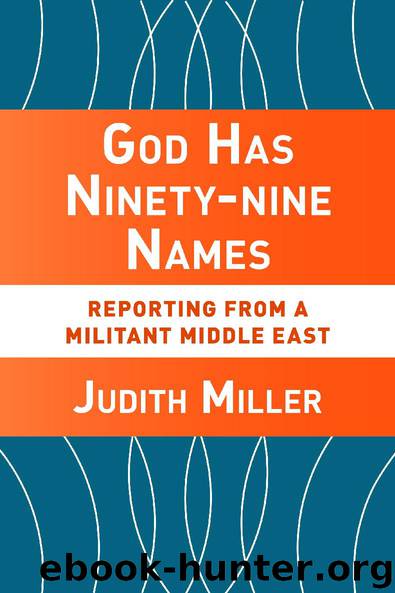God Has Ninety-Nine Names by Judith Miller

Author:Judith Miller
Language: eng
Format: epub
Publisher: Simon and Schuster
Published: 1996-07-15T00:00:00+00:00
The Sunnis despised France not only for its sometimes brutal occupation but also for the privileges and autonomous area that Paris gave the Alawis in 1920, and the state it created for them in 1922, to protect this beleaguered, constantly feuding minority from Sunni exploitation and persecution.
As Arab nationalism spread throughout Syria and other mandatory states in the Middle East, Alawites feared that their European protector would withdraw. In 1936 six Alawi notables begged the French occupiers not to do so. Given Sunni Arab Muslim hatred of “everything non-Muslim,” the notables wrote, French withdrawal would expose Syrian minorities to “death and annihilation” and would “end freedom of thought and belief,” A “dark fate” awaited Jews, Alawis, and other minorities if, as the Sunnis desired, Muslim Palestine were united with Muslim Syria, the notables warned. Among the letter’s signers was Sulayman al-Assad, Hafiz Assad’s father. 22
Their anxiety proved justified. In 1946, France, confronted by rising Syrian national sentiment, withdrew from the Levant, granting Syria independence but also abandoning the Alawis and other minorities that had helped Paris govern for more than two decades.
Sunni Muslim aristocrats would also never forgive the French for having dismantled Syria: Under the Ottoman agreements ceding Syria to the French, much of Syria’s coast was given to Christian-dominated Lebanon, and large sections of the Syrian province of Aleppo were ceded to Turkey. When the French finally withdrew, Syria was about half the size it had been under the Ottomans. Assad rarely omits to mention this historical injustice to visitors.
Syria’s leading Sunni families had long and lavishly supported the Muslim Brotherhood, founded in Syria in 1946 as a paramilitary organization and branch of the Egyptian Brotherhood. 23 While the Brotherhood everywhere was rigid and doctrinaire, the Hama branch, according to Tammam al-Barazi, a journalist who was born there, was especially uncompromising.
The Syrian Brotherhood, or the Ikhwan, had hated the ruling Baath Party ever since its creation in the 1940s as a nationalist alternative to communism. The Baath, which in Arabic means “renewal” or “rebirth,” favored everything the Brotherhood detested: socialism, secular government, and Western-style nationalism.
Despite religious and Sunni aristocratic opposition, the Baath’s ideological commitment to equal standing for all who embraced pan-Arabism had tremendous appeal within a country as ethnically varied as Syria, especially to such persecuted minorities as the Alawites. Among those attracted by the party’s policy of inclusion was a young student from Latakia whose family belonged to the least important of the Alawites’ four main tribal confederations —Hafiz Assad. 24 While young Assad shared his father’s disdain for the arrogant Sunni Muslims, he was part of a younger, more nationalist generation that, instead of embracing the French as his father had done, joined the Baath. In 1948, Muslim Brotherhood activists cornered the Baathist student leader and stabbed him repeatedly in the back. It took Assad several months to recover from the attack. The psychological wounds never healed.
When the Baath seized power in a military coup in 1963, Hama’s Sunni religious and political elite was outraged.
Download
This site does not store any files on its server. We only index and link to content provided by other sites. Please contact the content providers to delete copyright contents if any and email us, we'll remove relevant links or contents immediately.
| Arms Control | Diplomacy |
| Security | Trades & Tariffs |
| Treaties | African |
| Asian | Australian & Oceanian |
| Canadian | Caribbean & Latin American |
| European | Middle Eastern |
| Russian & Former Soviet Union |
The Secret History by Donna Tartt(19082)
The Social Justice Warrior Handbook by Lisa De Pasquale(12190)
Thirteen Reasons Why by Jay Asher(8907)
This Is How You Lose Her by Junot Diaz(6885)
Weapons of Math Destruction by Cathy O'Neil(6279)
Zero to One by Peter Thiel(5798)
Beartown by Fredrik Backman(5751)
The Myth of the Strong Leader by Archie Brown(5507)
The Fire Next Time by James Baldwin(5440)
How Democracies Die by Steven Levitsky & Daniel Ziblatt(5218)
Promise Me, Dad by Joe Biden(5153)
Stone's Rules by Roger Stone(5087)
A Higher Loyalty: Truth, Lies, and Leadership by James Comey(4959)
100 Deadly Skills by Clint Emerson(4924)
Rise and Kill First by Ronen Bergman(4785)
Secrecy World by Jake Bernstein(4751)
The David Icke Guide to the Global Conspiracy (and how to end it) by David Icke(4717)
The Farm by Tom Rob Smith(4506)
The Doomsday Machine by Daniel Ellsberg(4489)
